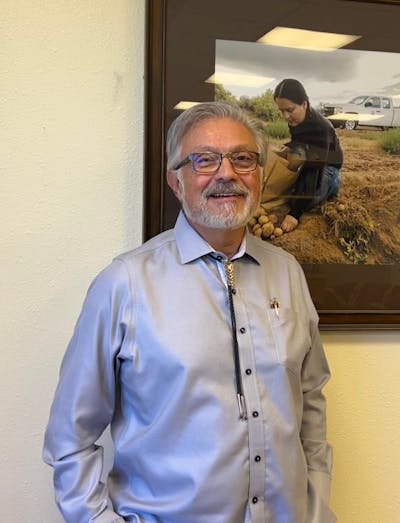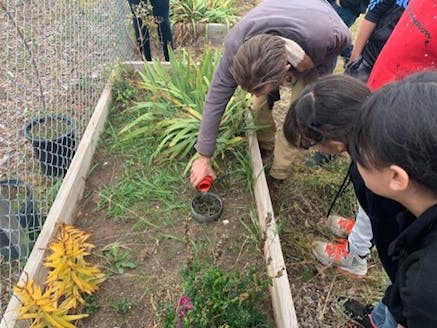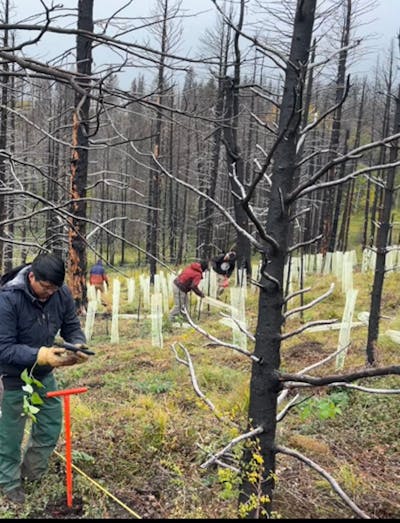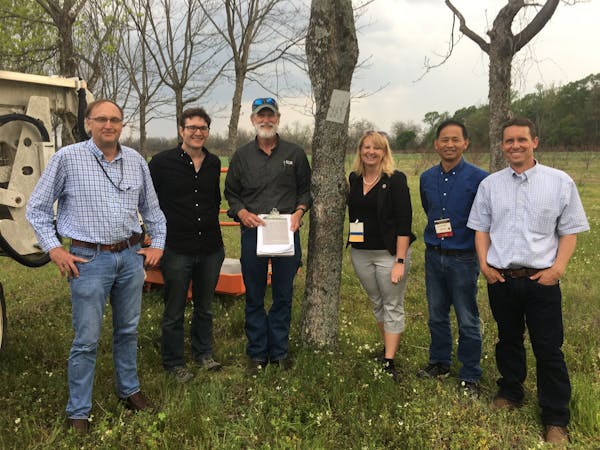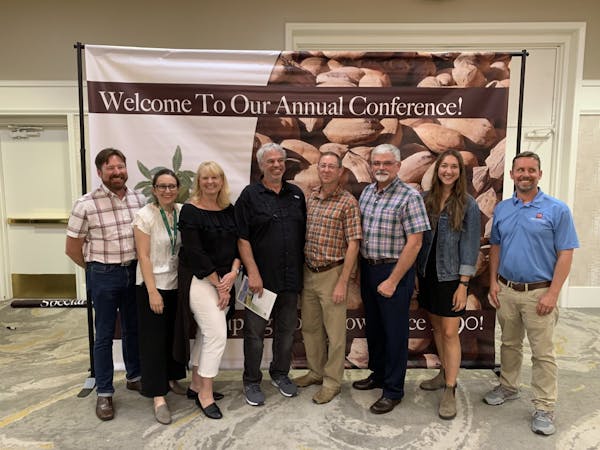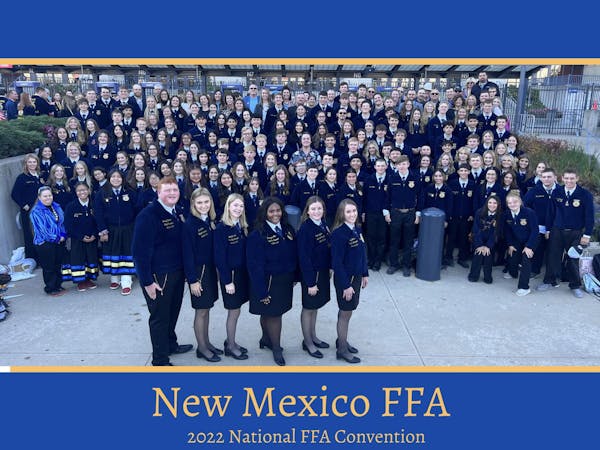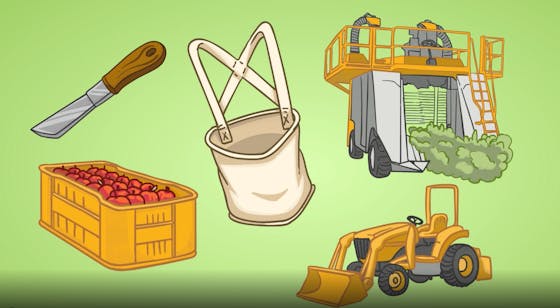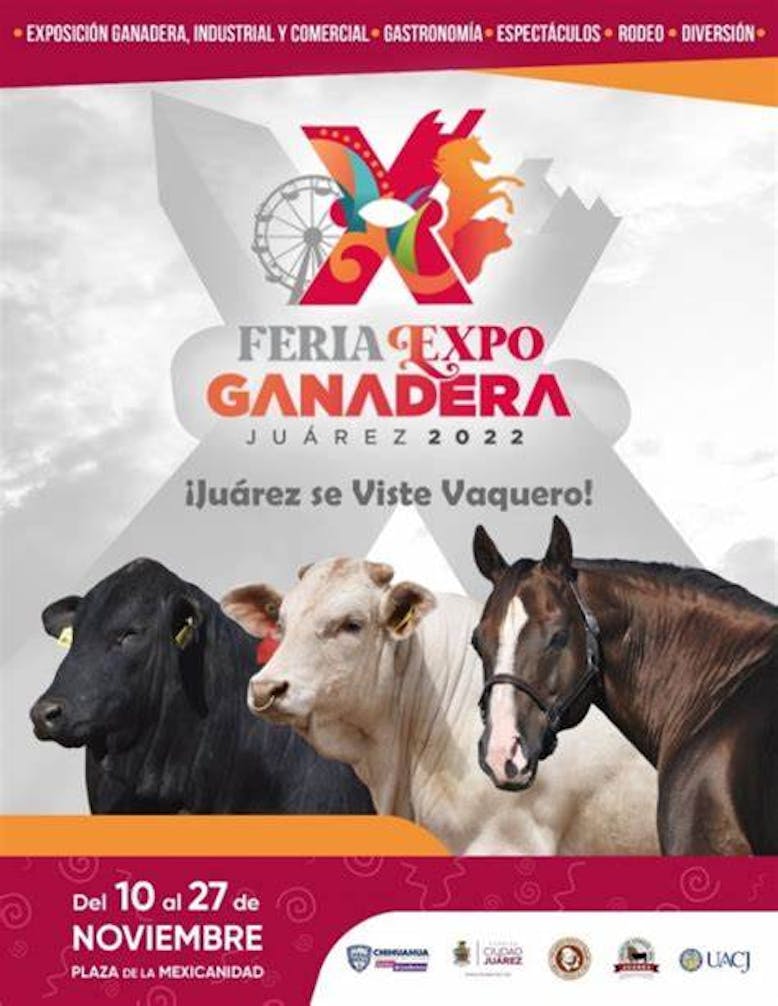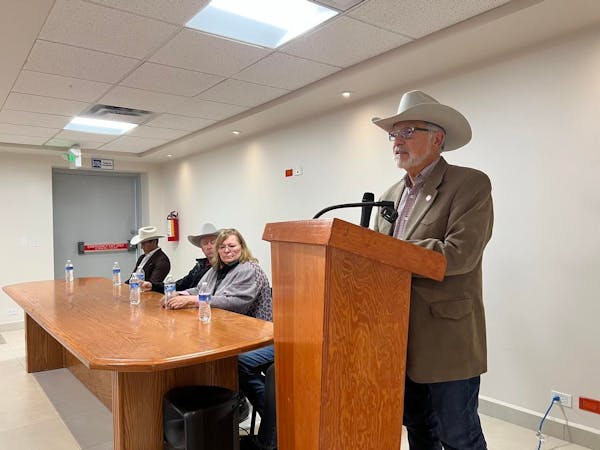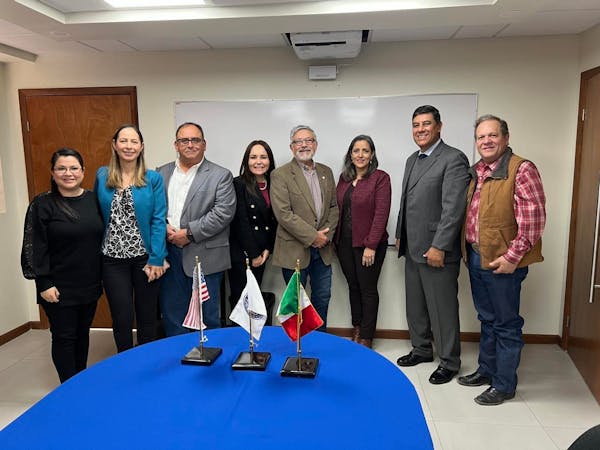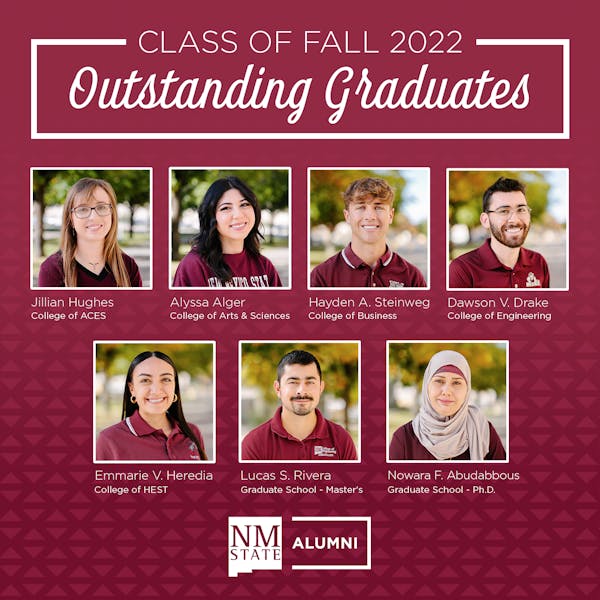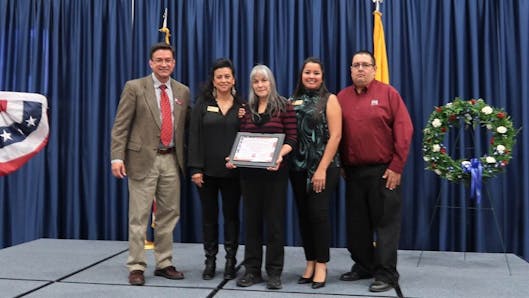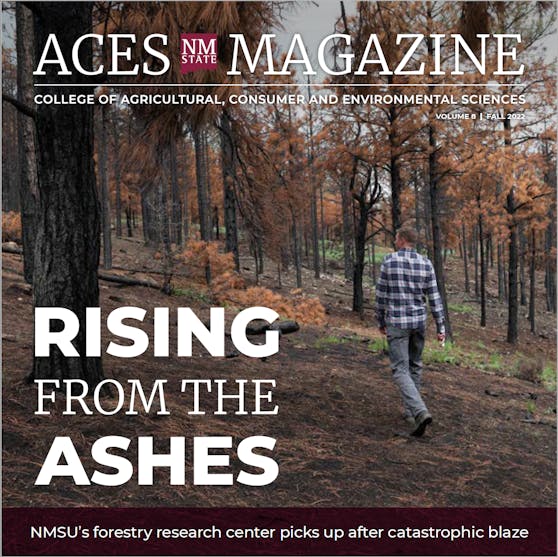VOLUME 22, ISSUE 14 11/22/2022 |
|
|
| Good day Aggies In this newsletter, you will get a feel for various activities of the college and see examples of the presence of the college at the root level in New Mexico. It is important to know that numerous industries are paying attention to what we do and how are we doing. We encourage you to look at all the projects that we have going on. If you have any questions, please don’t hesitate to let us know. Our faculty continue attracting outstanding grants to the college, such the grant described in this newsletter to develop genetic tools and resources to breed climate-adapted pecan trees that could combat vivipary and other challenges. This project is funded at over $8 million from the National Institute of Food and Agriculture, part of the U.S Department of Agriculture. |
|
|
The search for the provost continues and, so far, is going very well. We hope that by the end of January 2023 we will have a better understanding of who could be our next provost for our campus. We are getting ready for the Thanksgiving break, leading up to the conclusion of this year. A lot of positive things are moving smoothly forward with enthusiasm and optimism into 2023: New facilities, hopefully better budgets, more students, and newer faculty in our grants. In this newsletter, you will find the asks that we are putting forward with the legislature for AES and CES. If you have any questions, or if you see a way that you can support us, don’t hesitate to reach out. The positions that are being asked for are critical for the success of our land-grant university in our teaching, research, and extension activities. As usual, we extend our thanks to all of you for the attention and support that you give to our college and NMSU. We are here to answer any questions and concerns that you may have. We go full speed towards the end of the year. Happy Thanksgiving & Go Aggies! |
|
|
Rolando A. Flores Galarza Dean & Chief Administrative Officer |
|
|
On Behalf of Dean & Chief Administrative Officer Rolando A . Flores Galarza and the College of ACES, Happy Thanksgiving Everyone! |
|
|
Building Primary and Secondary Educators, Outdoor Learning Toolbox In late September, 85 primary and secondary educators from across New Mexico attended the Environmental Education of New Mexico Outdoor Learning Symposium. The goal of the symposium was to help educators build their toolbox to grow outdoor learning opportunities for youth. Peter Skelton, Director of the Extension and Research Youth Agricultural Science Center (YASC), provided a presentation on how the YASC integrates agricultural science and agricultural literacy into formal education using experiential and inquiry-based learning through field-based teaching and learning. The presentation included designing and developing outdoor classrooms, aligning NextGen science content standards with outdoor learning curricula, and identifying educational partnerships, like those offered through 4-H school enrichment programs. With decreased state funding and diminished school district resources, coupled with an emphasis on high-stakes testing and declining student achievement in math and science, the Cooperative Extension Service has an ever more important role to play in improving youth academic achievement through public education school enrichment programs. For more information, contact Interim Extension Department Head Dr. Laura Bittner at lbittner@nmsu.edu |
|
|
Working with educators and students on field-based soil science activities at the YASC |
|
|
On December 1, 2022, the Office of the Chief Economist at USDA requested a presentation of Dr. Sawssan Boufous' paper on Willingness to Accept sustainable production practices. Dr. Sawssan Boufous has recently joined the Department of Extension Economics as an Extension Specialist. The OCE is interested in hearing more about what the literature is saying about sustainable production practice adoption, because that is a major emphasis of Secretary Vilsak and USDA at this time. This is an invited presentation. The paper is co-authored by Dr. Darren Hudson and Dr. Carlos Carpio from Texas Tech University, and has been accepted for publication in the journal PLoS Sustainability and Transformation. For more information, contact Extension Specialist Dr. Sawssan Boufous at sawssanb@nmsu.edu |
| |
|
| Mora Forestry Research Center Replanting Efforts Over 4,000 aspen tree seedlings were planted in October on the Luna Fire footprint as part of a multi-faceted research project. These experiments, sponsored by CREST-NSF, are examining a range of nursery cultural practices and planting methodologies to determine which combination will improve both seedling growth and survival in these post-fire environments. Ancestral Lands Conservation Corps (Hopi, Zuni, Acoma, and Navajo tribes) assisted with the implementation of these research projects. Additionally, in October, the JTH Forestry Research Center hosted a large group of state/federal leaders and local landowners to have an open discussion on the next steps that need to occur after the Hermit's Peak/Calf Canyon Fire, including reforestation. In attendance were undersecretaries Robert Bonnie (Agriculture for Farm Production and Conservation) and Homer Wilkes (Natural Resources and Environment), Chief of the Forest Service Randy Moore, and Chief of the Natural Resources Conservation Service Terry Cosby. |
|
|
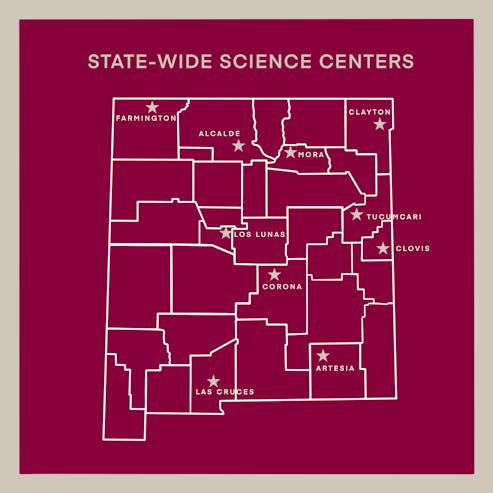 |
The Agricultural Experiment Station (AES) is requesting an increase of $765K from the New Mexico Legislature to support four faculty positions. These four faculty positions will be strategically placed at Agricultural Science Centers and serve as high-level system scientists to meet the biggest challenges within the state of New Mexico. These positions include a Forest Tree Ecophysiology Professor, housed at the J.T.H. Forestry Research Center at Mora, to help solve the challenges of identifying forest species and tree production systems suitable for drought- and fire-prone forest ecosystems. A Climate Smart Agriculture Professor, housed at the Farmington ASC, will develop a research program focused on climate-smart agriculture by increasing agricultural productivity and incomes, adapting and building resilience to climate change, and reducing or removing greenhouse gas emissions from agriculture. A Hydrology and Water Resources Professor, housed at the Artesia ASC, will focus on efficient irrigation practices and management of critical water resources. An Integrated Renewable Energy and Agricultural Natural Resources Professor, housed at the Corona Range and Livestock Research Center, will focus on integrating the broad field of clean renewable energy into a cohesive research program that would allow producers to better understand land/energy potential. For more information, contact Associate Dean/Director Dr. Leslie Edgar at ledgar@nmsu.edu |
|
|
As the New Mexico Cooperative Extension Service (CES) considers the most emergent challenges faced by our state, additional specialist positions will be critical to developing programs and providing resources to our communities. CES will be requesting funding from the NM Legislature to support four additional specialists. A Water Conservation Specialist will provide leadership in science-based extension education programming for agricultural producers and other water users. An Energy Specialist will provide programming in renewable energy and energy efficiency in an unbiased manner. This position will cover residential, agricultural, and commercial energy areas of interest. An Agricultural and Natural Resources Policy Specialist will provide programming to aid stakeholders in the interpretation of federal, state and county statutes, regulation and policy regarding water, land management, the environment, agricultural production, and estate planning. A 4-H STEM Extension Specialist will foster quality science learning, promote science literacy to youth and generate interest in and awareness of science-related education opportunities and careers. For more information, contact Associate Director Bruce Hinrichs at bhinrinch@nmsu.edu |
|
|
ENTOMOLOGY, PLANT PATHOLOGY, AND WEED SCIENCE (EPPWS) |
|
|
NMSU to lead multistate project to develop climate-adapted pecan trees New Mexico State University is leading a group of scientists working to develop genetic tools and resources to breed climate-adapted pecan trees that could combat vivipary and other challenges. The effort is part of a multistate research project headed by Dr. Jennifer Randall, a plant molecular biologist and plant pathologist in NMSU’s Department of Entomology, Plant Pathology and Weed Science in the College of Agricultural, Consumer and Environmental Sciences. Randall recently received a continual grant from the National Institute of Food and Agriculture, part of the U.S. Department of Agriculture, to fund the project for the next 4 years, starting with continual grant total of $8,045,985 (with the breakdown as follows: $3,999,860.00 for the first two years; in 2024 slated to received $2,018,057; and in 2025 the last installment of $2,028,068.00). The grant was awarded and will be recognized as a 'Center of Excellence'. WHO? New Mexico State University Dr. Jennifer Randall (Project Director) Dr. Richard Heerema (Co-Project Director)
Dr. Jay Lillywhite (Co-PI)
Dr. Joe Song (Co-PI)
Dr. Barbara Chamberlin (Co-PI)
Dr. Nicole Pietrasiak (Co-PI)
Dr. David Dubois (Collaborator)
Texas A&M University of Arizona HudsonAlpha University of Georgia University of Oklahoma University of California Agriculture and Natural Resources USDA-ARS: Pecan germplasm repository, College Station, Texas USDA-ARS: South East Fruit and Nut, Byron, Georgia USDA-ARs: Food Processing and Sensory Quality Research, New Orleans, Louisiana WHY? Pecan (Carya illinoinensis) is a large tree native to North America and grown commercially in 22 US states for its delicious and highly nutritious nutmeats. Pecan orchards can continue to produce for 100 years. The genetic diversity of pecan is the foundational resource for breeders to improve nut production across the broad climatic range of pecan cultivation, which spans the desert southwest to humid southeastern USA. Each region poses distinct horticultural challenges that constrain pecan production, including alternate bearing, disease pressure, salinity and drought stress, and these are all exacerbated by a changing climate. To address these constraints, this collaborative project integrates inquiries into the molecular and physiological basis of high value plant traits, tests for differential adaptation across environments, and ultimately identifies the genetics needed for traits and regions. These data will allow development of vital genetic tools necessary for increasing understanding of regional adaptation, promoting resource conservation, and selecting improved cultivars/rootstocks for all major pecan regions. We will specifically address key traits necessary for geographical adaptation of pecan such as timing of bud break, rootstock-scion interactions, salinity tolerance, microbiome composition, disease resistance, insect tolerance, and size control options. The scientific results from this effort will be used in a National Education Campaign to educate the public on the importance of plant genetics and changing climates using interactive medias. For more information, contact Professor Dr. Jennifer J. Randall at jrandall@nmsu.edu |
|
|
From left to right. Clive Bock (USDA-GA), Nolan Bentley (Texas A&M), LJ Grauke (USDA-TX), Jennifer Randall (NMSU), Xinwang Wang (USDA-TX), Richard Heerema (NMSU) |
| From left to right. Josh Sherman (University of AZ), Cristina Pisani (USDA-GA), Jennifer Randall (NMSU), James Walworth (University of AZ), Patrick Conner (University of GA), Ted Cottrell (USDA-GA), McKenzie Scott (NMSU graduate student), and Richard Heerema (NMSU). |
|
|
FUTURE FARMERS OF AMERICA (FFA) |
The National FFA hosted its National Convention in Indianapolis, Indiana during the week of October 26-29. Over 60,000 FFA members and guests attended, with many competing at the National level and obtaining the American Degree, which is the highest degree a member can obtain. Only 1% of members obtain the American Degree! In order to qualify to compete at the national level, students needed to win First Place at the state level to be able to represent New Mexico in Indianapolis. These students then worked very hard to obtain either a Bronze, Silver or Gold Rating at Nationals. Our chapters did an amazing job at Nationals and made New Mexico Proud! To see how our students did at Nationals and who obtained the American Degree, visit http://www.nmffa.org/national-convention.html |
|
|
IDEAS FOR COOKING AND NUTRITION (ICAN) |
Ideas for Cooking and Nutrition (ICAN) gets hands-on with New Mexico students New Mexico State University Ideas for Cooking and Nutrition program (ICAN) joined 40 other presenters for the 2022 STEM Ag Career Fair Day on November 2, 2022, hosting over 400 middle and high school students from 27 middle schools throughout the state. Our Doña Ana County ICAN coordinator Diana Mangallanez and ICAN Program manager Marisa Van Dommelen joined New Mexico Agriculture in the Classroom at the New Mexico Farm and Ranch Heritage Museum. They showed students the new MyPlate MyDay interactive online teaching tool to supplement nutrition lessons that feature familiar foods to New Mexicans. Students explored concepts of planning meals for a day and learned about the foods they eat. Students also learned about careers in Nutrition and Dietetics. This opportunity showed the students that there is much to learn about New Mexico Agriculture. |
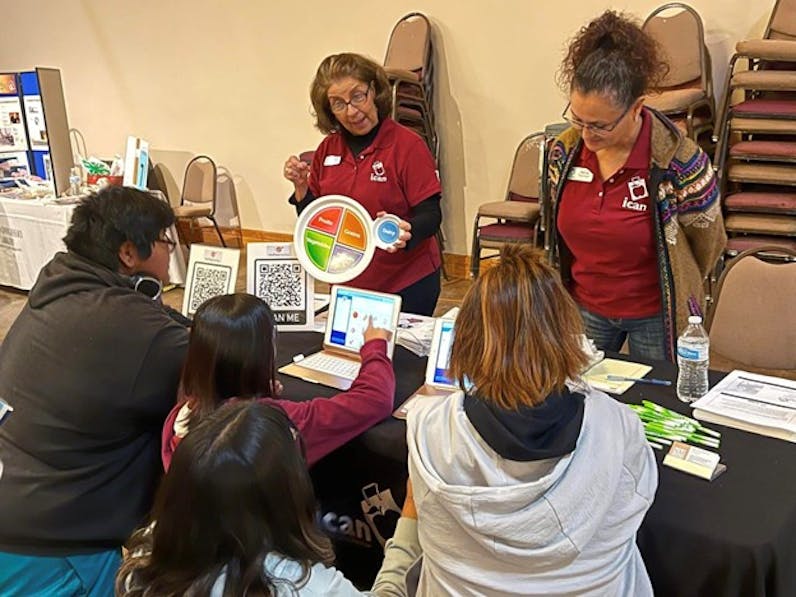 |
Figure 1: NMSU ICAN Supervisor, Diana Mangallanez and NMSU ICAN Program Manager, Marisa Van Dommelen showing students an online teaching tool |
|
|
INNOVATIVE MEDIA RESEARCH & EXTENSION |
|
|
New interactive resource on cleaning and sanitizing farm tools Introducing a new interactive virtual lab designed and produced by the NMSU Department of Innovative Media, Research and Extension! Cleaning and Sanitizing Farm Tools and Equipment explores post-harvest food safety practices for produce operations, including how to properly test sanitizers for use on food contact surfaces. These procedures help minimize potential contamination from pathogenic microorganisms, reducing cross-contamination and the incidence of foodborne illnesses. Three web modules and an introductory animation cover various sanitizers, such as chlorine and peroxyacetic acid, and various methods for testing sanitizer concentration, such as test strips and titration. The materials are available in English and Spanish. This project was sponsored by the Washington State Department of Agriculture, the University of Georgia College of Agricultural and Environmental Sciences, and the Washington State Department of Agriculture (WSDA), with financial support from the WSDA Food Safety Program, the WSDA Regional Markets Program, and the Food and Drug Administration (FDA) of the U.S. Department of Health and Human Services (HHS). For more information, contact Interim Department Head/Professor Dr. Barbara Chamberlin at bchamber@nmsu.edu |
|
|
The College of ACES has been attending various agricultural exhibitions in Mexico these past months. The purpose of assisting such exhibitions is to promote not only the College of ACES but NMSU in general to potential students. International students are an important and valuable part of the NMSU community. Outreach and public engagement are part of NMSU’s LEADS 2025 Goal 3: Amplify Extension and Outreach. One of the most recent expositions is the one taking place at the moment in Ciudad Juárez from November 10 through the 27. Dean & Chief Administrative Officer Rolando A. Flores Galarza was invited on behalf of the Association Ganadera de Ciudad Juárez as part of the events and activities organized for the Binational Meeting Mex – USA between representatives of the three neighboring States: New Mexico, Texas and Chihuahua. It was a great opportunity to share knowledge between the two countries trying to come up with common solutions and add value to their communities while gathering together and having open discussions. For more information, contact Planning Officer Erika De La O Medina at erikadlo@nmsu.edu |
|
|
Dean & Chief Administrative Officer Rolando A. Flores Galarza giving opening remarks at Universidad Autonoma de Ciudad Juárez (UACJ) |
| Left to Right. Guadalupe Alejandra Cardoso Mendiola, Subdirección de Cooperación e Internacionalización (UACJ), Yadira Isela Marquez Gonzalez, Subdirección de Cooperación e Internacionalización (UACJ), Ramon Rivera Barreno, Departamento de Ciencias Veterinarias (UACJ), Erika De La O Medina, Planning Officer, Dean’s Office (NMSU), Dean & Chief Administrative Officer Rolando A. Flores Galarza (NMSU), Directora General de Vinculación e Intercambio, Tania Hernandez Garcia (UACJ), Salvador David Nava Martinez, Dirección del Instituto de Ciencias Biomédicas (UACJ), Eduardo Medina, Program Manager, Extension Economics (NMSU) |
|
|
On behalf of the NMSU Alumni Association and the College of ACES, we are delighted to announce the Outstanding Graduates for the Fall 2022 semester. Congrats, Jillian Hughes: we are very proud of your accomplishments! |
|
|
Pamila Miller, Administrative Staff in the Dean's office, College of ACES, received a Certificate of Recognition for the work she has done in support of the military and veterans programs at NMSU at the NMSU Faculty & Staff Veterans and ROTC Anniversary banquet Friday night. |
|
|
COLLEGE OF ACES MAGAZINE – FALL 2022 ISSUE |
|
|
The College of Agriculture, Consumer and Environmental Sciences is an engine for economic and community development in New Mexico, improving the lives of New Mexicans through academic, research, and Extension programs. |
|
|
| |

